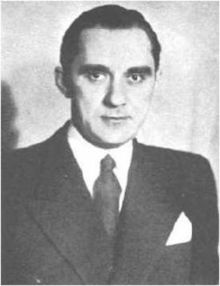- Mihai Antonescu
-
Mihai Antonescu 
Vice President of the Council of Ministers,
Minister of Foreign AffairsIn office
1 January 1943 – 23 August 1944Monarch Mihai I Prime Minister Ion Antonescu Preceded by Ion Antonescu Succeeded by Grigore Niculescu-Buzeşti Personal details Born 18 November 1904
Nucet, DâmboviţaDied 1 June 1946 (age 41)
near Jilava (executed by firing squad)Resting place unknown Nationality Romanian Cabinet Antonescu Mihai Antonescu (November 18, 1904 – June 1, 1946) was a Romanian politician who served as Deputy Prime Minister and Foreign Minister during World War II.
Contents
Early career
Born in Nucet, Dâmboviţa County, went to school in Piteşti, and then at the Saint Sava National College in Bucharest. From 1922 to 1926 he attended the Faculty of Law of the University of Bucharest. Antonescu made his living as an attorney before becoming Prime Minister Ion Antonescu’s (to whom he was not related) Minister of Propaganda in 1940. Antonescu was initially not an extremist or supporter of the Iron Guard, whose leaders held prominent positions in Ion Antonescu’s government in 1940-1941 (see National Legionary State); in the 1930s, he was a member of the National Liberal Party-Brătianu.
As minister, he drifted to the far right, and established contacts with the German Nazi Party. Antonescu subsequently became one of Ion Antonescu’s most trusted advisors, especially when the Iron Guard's leader, Horia Sima (who was also deputy prime minister), became increasingly uncooperative. He was effective in censoring governmental critics and enforcing blatant Anti-Semitism in the media.
When the Iron Guard was suppressed and removed from power in January 1941 (see Legionnaires' Rebellion and Bucharest Pogrom), Mihai Antonescu was promoted to Deputy Prime Minister and Minister of Foreign Affairs, making him the second most powerful man in the country (see Romania during World War II).
Prominence
Throughout 1941, especially after the Invasion of the Soviet Union, Ion Antonescu primarily focused on Romania’s military affairs, leaving Mihai Antonescu in almost full control of the country’s domestic matters. Although initially uncomfortable with Romania’s close alliance with Germany, Antonescu strengthened the nation’s ties with Adolf Hitler's regime after a string of early Axis victories against the Soviets. Antonescu primarily attempted to gain Germany’s favor by persecuting Romania’s Jews. Essentially running the interior ministry, he drafted a series of laws that resulted in thousands of Romania’s Jews being forced out of their jobs and positions, while at the same time they were denied access to countless other careers. More such laws resulted in the country’s Jews having their property seized.
Throughout 1941, Antonescu would approve the pogrom against the Jews of Iaşi, stop the emigration of Jews from Romania, and remove the Romanian government’s protection of Romanian Jews outside the country, thus leaving them in German-occupied areas at the mercy of the Nazis. He also approved the slaughter of Jews in Bessarabia and Bukovina, and the deportation of the survivors to concentration camps in Transnistria.
Late in the war and execution
As 1942 came to a close, Antonescu became alarmed at the deterioration of the Axis war effort and started looking for ways to withdraw Romania from the war. He attempted to persuade Hitler to make peace with the Western Allies and focus the full power of the Axis forces on the Soviet Union. When the Soviets won the Battle of Stalingrad on February 2, 1943, Antonescu came to the conclusion that the war was lost for the Axis, proceeding to destroy files and documents that revealed his active persecution of Romania’s Jews. With Ion Antonescu's approval, he came to advocate the withdrawal from conflict of all minor allies of the Nazis - Romania, Hungary, Italy, and Finland.
Antonescu believed Benito Mussolini was powerful enough to stand up to Hitler, and that Italy could successfully negotiate an armistice with the Western Allies. Under Antonescu’s plan, the four states and other European nations would turn against Hitler and join the Allies against Germany. In his capacity as foreign minister, Antonescu strengthened Romania’s ties with Italy and paid a visit to Mussolini in June 1943, at which time he discovered that Mussolini agreed with certain aspects of his plan but was less than enthusiastic in regard to actually implementing it. Antonescu subsequently increased his efforts to improve Romania’s relations with the United States and Great Britain. As such, he stopped the deportations of Romania’s Jews, allowed Jewish emigration to non-Axis nations, and repatriated those who had survived Transnistria.
On August 23, 1944, as Soviet forces drew closer and closer to Romania, King Michael dismissed the government of Ion Antonescu, declared the nation’s surrender, and had Mihai Antonescu arrested. He was subsequently handed over to the new authorities, tried by a Communist Party-influenced Bucharest People's Tribunal, and found guilty of war crimes. He was executed by a firing squad, together with Ion Antonescu, Constantin Vasiliu and Gheorghe Alexianu, near the fort of Jilava.
External links
- Actual footage of Antonescu's death before a firing squad (May be unsuitable for sensitive viewers)
Categories:- Romanian fascists
- Romanian lawyers
- Deputy Prime Ministers of Romania
- Romanian Ministers of Foreign Affairs
- People from Dâmboviţa County
- Saint Sava National College alumni
- University of Bucharest alumni
- World War II political leaders
- Executed Romanian Nazi collaborators
- Holocaust perpetrators
- People convicted by the Romanian People's Tribunals
- Romanian people convicted of war crimes
- Deaths by firearm in Romania
- People executed by the Kingdom of Romania
- Filmed executions
- 1904 births
- 1946 deaths
Wikimedia Foundation. 2010.
